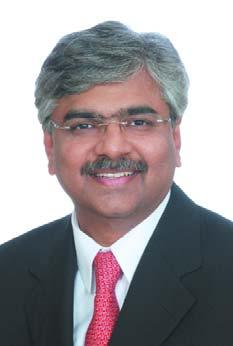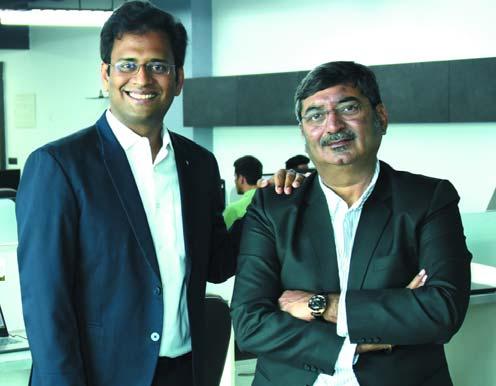
9 minute read
MEDTECH M&AS: GATEWAYTO SUSTAINABLE GROWTH
Even though M&Awill continue to loom large while the MedTech spectrum witnesses heavy consolidation in a teeming market,helping both survival and competitive edge, Nitin Potdar, M&APartner,J.Sagar Associates,cautions that players cannot simply rely on the conducive pandemic environment to further their M&A/JVstrategies.Patents,IPs,geographical reach and quality of innovation will separate the leaders from the followers
Healthcare is a key sector that was directly and deeply affected by the ripples of the pandemic in diverse ways. While the tiny, lethal virus impacted the M&A activity in this space -- given the lockdowns and mobility restrictions -- it also brought together competing life science and pharma players to work on lifesaving drugs and vaccines in record timeframes. In fact, many diagnostic players with digital COVID-19 offerings were able to make up for their otherwise sluggish mainstream activity.
M&A in the MedTech space is gradually taking off, led by glittering cases in point, including the $2.8 billion BioTelemetry acquisition by Philips and the Siemens' takeover of radiation therapy player Varian.
In 2021, PerkinElmer made waves by acquiring infectious disease-testing tool-maker Oxford Immunotec for $591 million while Hologic's twin acquisitions hit the headlines among other MedTech deals: namely, Somatex, a localisation technology expert for $64 million and Biotheranostics, maker of proprietary molecular tests for metastatic cancers, for $230 million.
Looking beyond, M&A will continue to loom large while the MedTech spectrum - including imaging technologies, remote monitoring and virtual health systems, therapeutic devices, and research and lab equipment - witnesses heavy consolidation in a teeming market, helping both survival and competitive edge. Artificial intelligence, 3D printing, Internet of Things (IoT), nanotechnology, big data, virtual reality, cloud infrastructures, sensor technologies and genomics are providing the most credible foundation to help the merged and acquired entities to deliver on the return on investment (RoI) promise.
That said, key players in this space - including those providing and using devices, tools and systems in key segments such as in-vitro diagnostics, cardiology, neurology and diabetic care - cannot simply rely on the conducive pandemic environment to further their M&A and joint venture (JV) strategies.
Undoubtedly, the hunt for niche and agile startups will lead the M&A boom - whether to scale up, diversify into new
markets, or disrupt them. Patents, IPs, geographical reach and quality of innovation will separate the leaders from the followers. Legal due diligence will become even more critical in validating the strength of patents, products, technologies, and financial muscle and talent.
In an era of looming threats and uncertainties - whether biological or manufactured - corporate M&As are on the brink of several inflection points that necessitate decontamination of processes and methods to ensure sustainable growth in the emerging order. While the possibility of further mutations is not yet ruled out, and vaccines are not the silver bullet, many think they are, we must deal with equally bigger threats such as bioterrorism and climate change, apart from many others that may be lurking in the dark, like COVID was. This exasperating fear of the unknown has changed the M&A playbook in more ways than one. The pandemic lesions have taught us endemic lessons, redefining the momentum and methods of corporate growth strategies whether M&As, JVs or collaborations.
Many MedTech firms may need to tweak their business models and supply chains to address the shifting trends of a highly volatile market. Disease management would need to put a premium on disruptive innovation as also wellness and wellbeing, given the need for fortifying human immunity in the wake of growing biological invasions. Evidence-based medicine will become a norm, not an option.
In a business world engulfed by technological advancements, industry players cannot afford to be unaware of the essence and credence of the reigning trends - whether cloud-enabled infrastructures, AI-powered applications, or hyper automation-led operations. They would have to wilfully embrace a dynamic-by-default business environment defined by remote working, contactless deliveries,
and micro-mobility solutions, as also put the all-pervasive technology paradigms into practice - whether effecting essential customer service improvements through micro-moments, enhancing key business decisions and resolving sticky market challenges with big data analytics and quantum computing, carrying out product improvements through IoT and nanotechnology, initiating digitalisation and blockchain-led supply chain efficiencies, or transforming manufacturing and operational systems with the help of collaborative robots or cobots, drones, aerial birds, and additive manufacturing. These defining paradigms would no longer remain buzzwords for posterity; rather, they would become business anthems for achieving a real-time production and productivity boost, here and now!
Contrary to the naysayer predictions of insular, inwardlooking and authoritarian nation-states, COVID-19 has not killed globalisation. Rather, it has put it in perspective. Ask the virologists, epidemiologists, and environmentalists, and they will readily agree. The pandemic has also triggered a faster transition towards Industry 5.0 - a coming era seeking to reinstate the human element into hi-tech manufacturing and operating environments.
Consequently, MedTech companies - big and small - will have to adopt a new approach christened as the GPS paradigm for M&As and JVs, which represents three inter-woven prerequisites. One, the acquisition of ground intelligence before undertaking any M&A or initiation of JV talks; two, the need to foster unconventional partnerships that pave the way for disruptive innovation; and three, the design and delivery of strategic solutions. G stands for Ground Intelligence, P stands for Partnerships rooted in unconventionality and S stands for Strategic Solutions.
The GPS paradigm, by virtue of the synergistic play of the G, P, and S components, will help these organisations discover and study key global paradigms (both existing and evolving), establish their own growth co-ordinates, and chart their progression through potent growth strategies, including M&A and JVs. The GPS paradigm is a unique, wholesome global positioning system to help MedTech companies with the fusion of landscape navigation, astute collaboration and sustainable progression in the same breath.
The hunt for niche and agile startups will lead the M&Aboom - whether to scale up,diversify into new markets,or disrupt them.Patents,IPs,geographical reach and quality of innovation will separate the leaders from the followers.Legal due diligence will become even more critical in validating the strength of patents,products,technologies,and financial muscle and talent
(Views expressed are personal.)
STARTUP
INTERVIEW
Our plan is to make MediSage accessible to all healthcare providers in the country right from a doctor sitting in rural India to a nurse practising in urban India,inform Bhagwat Dhingra, founder,and Abhishek Ghosh,co-founder,MediSage,to Akanki Sharma,while touching upon other topics related to the digitisation of medical information
Give us a brief description about MediSage.
MediSage is a healthtech platform empowering doctors to stay up-to-date with curated medical content with the motto "for the doctors by the doctors." It aims to keep them abreast with the latest medical knowledge, global best practices, case-based discussions, etc. Doctors can stay up-to-date through webinars, expert videos, medical conferences, journal articles, podcasts and chat casts, among other easy-toconsume formats. They can simply sift through the vast repository of content created by global and national experts, carefully curated by MediSage, to improve patient outcomes through accurate diagnosis and the best-in-class treatment.
Incepted in November 2019 with its digital platform launched in April 2020, MediSage currently has more than 400 experts creating topnotch content on regular basis. Collaborating with top global universities, medical associations, subject matter experts and medical bodies, it develops, curates and certifies content to help doctors across various specialties. With a 'by doctors, for doctors' motto, the up-and-coming platform is a one-stop solution catering to all the knowledge requirements of the medical fraternity, and is completely free of cost with no subscription fee.
What major gaps do you think exist between patients and doctors in the present times, especially with regards to COVID-19?
In the current times, even

Bhagwat Dhingra (right),founder and AbhishekGhosh (left), co-founder,MediSage
though the technology is available, there are still a large number of doctors, especially from tier-II and -III cities who do not have access to updated knowledge.
COVID came as a whole new learning experience for the medical fraternity. In the beginning, our doctors were fighting an unknown enemy as there was no complete information available for them to read or to refer to. Right from how to differentiate between symptoms of flu v/s symptoms of COVID, which medication to use, understanding co-morbidities, controlling other clinical challenges, the knowledge did not reach doctors, especially in tier-II towns. This compromised patient treatment. With digital interventions, speed at which knowledge can travel has increased, impacting the way doctors are treating patients.
What kind of content is being made available on the platform and what's the source of information that is being stored here?
MediSage publishes global experts' evidence-based advice in video and podcast format, and also enables live interactions with national and international experts. Additionally, it brings updated news feed from globally reputed journals and runs multiple discussion forums. 'Credibility' is an important pillar in healthcare and MediSage ensures all content is not only credible, but is sourced from the best-known experts in that therapy. MediSage has tied up with national and international universities, medical associations and experts to further strengthen content generation.
The platform works with all leading Indian and international medical associations such as RSSDI, FOGSI, API, etc. Multiple university tie-ups are underway where the intent is to bring short format courses which doctors can use to enhance their skillsets.
Tell us about your revenue model. How do you manage the expenses for running this platform?
Pharma, device and diagnostic companies like to engage on scientific discussions with doctors, and, so far, have been able to do so sporadically and in small groups. With a platform like MediSage, these companies can get their scientific messages out to a larger audience. We earn revenues by engaging with such organisations and in helping them build a robust scientific message and then delivering the same through a platform.
How robust is the global medical information market at the moment? Do hospitals, healthcare providers and pharma companies play any crucial role at Medisage? Explain in detail.
Medical information is the cornerstone of the healthcare ecosystem in any country. In vast countries like India, both creation and dissemination of medical information is a big challenge. While today, more pharma companies are spending time on doing research on diagnostic, new molecules and new treatment regimens, dissemination of such information remains a challenge.
We are bringing all healthcare participants including hospitals, healthcare providers and pharma companies on one single platform to enable such cross pollination of knowledge to happen. New products cannot be developed unless doctors come across challenges in treating patients with old drugs or find compliance, efficacy or side-effect challenges with existing products. Similarly, healthcare ecosystem thrives when doctors are able to use new diagnostic techniques, new drugs for better patient outcome. So, this loop can run efficiently in a digital environment because of the sheer speed, scale and credibility of information flow.
What are your future plans for Medisage?
Our plan is to make MediSage accessible to all healthcare providers in the country right from a doctor sitting in rural India to a nurse practising in urban India. This way, even a patient in the remotest part of the country will have access to the same quality of diagnosis and treatment as someone accessing healthcare in a metro city. Numerous neurological disorders, skin diseases, hypertension cases or cancer cases go undiagnosed because of lack of right knowledge to diagnose. We are already expanding our footprint to India-like markets where the challenges amongst doctor fraternity are similar. Our partnerships with leading pharma companies, medical associations and universities are helping us create cuttingedge content, the likes of which doctors had never envisaged. We will continue building on that strength.
akanki.sharma@expressindia.com journoakanki@gmail.com



